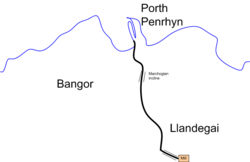Penrhyn Quarry Railway
| Penrhyn Quarry Railway | |
|---|---|
| Locale | Wales |
| Dates of operation | 1798 – 1962 |
| Successor line | abandoned |
| Track gauge | 2 ft ½ in (until 1879) 1 ft 103⁄4 in (578 mm) |
| Headquarters | The Quarry Office, Port Penrhyn, Bangor. |
The Penrhyn Quarry Railway first opened in 1798 as the Llandegai Tramway; it became the Penrhyn Railway in 1801 although on a different route. Constructed to transport slate from Lord Penrhyns' slate quarries at Bethesda to Port Penrhyn at Bangor, Wales. The railway was around six miles long and used a gauge of 1 ft 103⁄4 in (578 mm). It is one of the oldest narrow gauge railways in the world; and it was closed in 1962.
The Penrhyn Railway Heritage Trust are currently attempting to reopen a section of the original railway near Bethesda.
Contents
History
Llandegai Tramway (1798-1831)
The earliest predecessor to the Penrhyn Quarry Railway was the mile long 2 ft ½ in gauge Llandegai tramway which was built in 1798. The tramway was connected to a local flint mill that ground clay and chert into flints. These were transported to Porth Penrhyn on the coast by the tramway, which was one of the earliest overground railways in Britain. It included two balanced gravity inclines one from the floor of the Cegin valley near Llandegai to the hills above Bangor, the other dropping from there to the mill. Both inclines used vertically mounted winding drums.
Penrhyn Railroad (1801-1878)
The success of the Llandegai Tramway encouraged the owners of the Penrhyn quarry to consider a similar tramway from their slate quarry to Porth Penrhyn. The plan subsumed the existing tramway into a longer railroad that connected Bethesda to the sea.
Construction started on 2nd. September 1800, relaying and extending the Llandegai Tramway, with the first slate train traveling on 25th. June 1801. The new railroad was also 2 ft ½ in gauge. The connection to the Llandegai flint mill continued to be used until 1831. The railroad was operated by horse power along with balanced inclines and gravity.
Penrhyn Quarry Railway (1878-1962)
By the early 1870s the Penrhyn Quarry Railroad was no longer able to keep up with the output of the Penrhyn quarry. By 1874 the decision had been made to replace the railroad with a steam locomotive worked railway. Steam locomotives had already been introduced with great success on the quarry's internal railway system and at the nearby Dinorwic Quarry.
At the end of 1875 the first "mainline" locomotive was delivered to Port Penrhyn and moved to the quarry workshops at Coed y Parc. The railroad was converted into the new railway in five stages from 1877 to 1878.
Locomotives
These are the locomotives that worked trains between the quarry and the port, often known as the "mainline" locomotives.
| No. | Name | Builder | Type | Date built | Disposal | Notes |
|---|---|---|---|---|---|---|
| Bronllwyd | Valley Foundry | 0-4-0VB | 1875 | Scrapped 1906 | Used in the construction of the railway by contractor Richard Parry | |
| 3 | George Sholto | Stephen Lewin | 0-4-2WT | 1875 | Scrapped 1880 | |
| Edward Sholto | De Winton | 0-4-0ST | 1876 | Scrapped 1907 | ||
| Hilda | De Winton | 0-4-0T | 1878 | Scrapped 1911 | ||
| Violet | De Winton | 0-4-0T | 1879 | Scrapped 1911 | ||
| Charles | Hunslet | 0-4-0ST | 1882 | Preserved at Penrhyn Castle Railway Museum, Bangor | ||
| Linda | Hunslet | 0-4-0ST | 1893 | Out of service at the Ffestiniog Railway | ||
| Blanche | Hunslet | 0-4-0ST | 1893 | Running on the Ffestiniog Railway | ||
| 1 | Llandegai | Baldwin | 2-6-2T | 1916 | Converted to stationary engine scrapped 1940 | ex-War Department Light Railways |
| 2 | Felin Hen | Baldwin | 2-6-2T | 1916 | Sold 1940 to Australia, now privately owned France | ex-War Department Light Railways |
| 3 | Tregarth | Baldwin | 2-6-2T | 1916 | Scrapped 1940 | ex-War Department Light Railways |
See also
References
- Boyd, James I.C. (1985). Narrow Gauge Railways in North Caernarvonshire, Volume 2: The Penrhyn Quarry Railways. ISBN 0-85361-312-5.
External links

